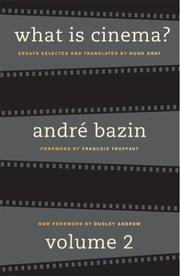| Listing 1 - 3 of 3 |
Sort by
|
Book

ISBN: 2843103657 284310288X Year: 2016 Publisher: Grenoble : UGA Éditions,
Abstract | Keywords | Export | Availability | Bookmark
 Loading...
Loading...Choose an application
- Reference Manager
- EndNote
- RefWorks (Direct export to RefWorks)
« Il faut en permanence mettre en marche quelque chose de nouveau » déclarait Roberto Rossellini à l'occasion d'un colloque organisé en marge de sa présidence du Festival de Cannes 1977, quelques semaines avant sa mort. Le présent recueil, en associant esthétique et fabrique, plutôt que de penser les films de Rossellini au miroir de la seule société italienne ou en fonction de la prétendue césure entre cinéma et télévision, se propose de suivre ses multiples itinéraires. Les déplacements géographiques s'associent à des trajectoires historiques et temporelles complexes. Ce livre envisage aussi comment les films se font l'écho des sculptures, des textes poétiques, des créations théâtrales, des textes philosophiques que le cinéaste croise sur son parcours. L'autre piste, et cet enjeu est considérable, concerne l'empreinte des idées cinématographiques de Rossellini sur le cinéma moderne et contemporain, qui poursuit en quelque sorte les chemins tracés tout en les réinventant. Autrement dit, les films de Rossellini continuent leur fabrique…
Film Radio Television --- Roberto Rossellini --- cinéma --- critique
Book
ISBN: 9781487507107 1487507100 1487535570 1487535589 Year: 2020 Publisher: Toronto ; Buffalo ; London : University of Toronto Press,
Abstract | Keywords | Export | Availability | Bookmark
 Loading...
Loading...Choose an application
- Reference Manager
- EndNote
- RefWorks (Direct export to RefWorks)
"Neorealism emerged as a cultural exchange and a field of discourse that served to shift the confines of creativity and revise the terms of artistic expression not only in Italy but worldwide. If neorealism was thus a global phenomenon, it is because of its revolutionary portrayal of a transformative moment in the local, regional, and national histories of Italy. At once guiding and guided by that transformative moment, neorealist texts took up, reflected, and performed the contentious conditions of their creation, not just at the level of narrative content but also in their form, language, and structure. Italian Neorealism: A Cultural History demonstrates how they did so through a series of representative case studies. Recounting the history of a generation of artists, this study offers fundamental insights into one of the most innovative and influential cultural moments of the twentieth century."--
Motion pictures --- Realism in motion pictures. --- Motion pictures. --- History. --- Italy. --- Elio Vittorini. --- Fascism. --- Italian Film. --- Italian Literature. --- Italo Calvino. --- Luchino Visconti. --- Neorealism. --- Roberto Rossellini. --- Vittorio De Sica. --- artistic movements. --- cultural history. --- modern art. --- realism. --- Italia --- Italian Republic --- Italianska republika --- Italʹi͡anskai͡a Rėspublika --- Italie --- Italien --- Italii͡ --- Italii͡a Respublikasi --- Italiĭsʹka Respublika --- Itālija --- Itālijas Republika --- Italijos Respublika --- Italikē Dēmokratia --- Īṭāliy --- Italiya Respublikasi --- It'allia --- It'allia Konghwaguk --- İtalya --- İtalya Cumhuriyeti --- Iṭalyah --- Iṭalye --- Itaria --- Itaria Kyōwakoku --- Jumhūrīyah al-Īṭālīyah --- Kgl. Italienische Regierung --- Königliche Italienische Regierung --- Laško --- Lýðveldið Ítalía --- Olasz Köztársaság --- Olaszország --- Regno d'Italia --- Repubblica italiana --- Republiḳah ha-Iṭalḳit --- Włochy --- Yidali --- Yidali Gongheguo --- Italy

ISBN: 0520931254 9780520931251 9780520931268 0520931262 0520242270 9780520242272 0520242289 9780520242289 130607360X Year: 2005 Publisher: Berkeley, Calif. University of California Press
Abstract | Keywords | Export | Availability | Bookmark
 Loading...
Loading...Choose an application
- Reference Manager
- EndNote
- RefWorks (Direct export to RefWorks)
André Bazin's What Is Cinema? (volumes I and II) have been classics of film studies for as long as they've been available and are considered the gold standard in the field of film criticism. Although Bazin made no films, his name has been one of the most important in French cinema since World War II. He was co-founder of the influential Cahiers du Cinéma, which under his leadership became one of the world's most distinguished publications. Championing the films of Jean Renoir (who contributed a short foreword to Volume I), Orson Welles, and Roberto Rossellini, he became the protégé of François Truffaut, who honors him touchingly in his foreword to Volume II. This new edition includes graceful forewords to each volume by Bazin scholar and biographer Dudley Andrew, who reconsiders Bazin and his place in contemporary film study. The essays themselves are erudite but always accessible, intellectual, and stimulating. As Renoir puts it, the essays of Bazin "will survive even if the cinema does not."
Motion pictures. --- Performing arts. --- Show business --- Arts --- Performance art --- Cinema --- Feature films --- Films --- Movies --- Moving-pictures --- Audio-visual materials --- Mass media --- Performing arts --- History and criticism --- Aesthetics --- Film --- auteur. --- bazin. --- cahiers du cinema. --- chaplin. --- cinema and screen. --- cinema. --- citizen kane. --- critical theory. --- cultural studies. --- digital film. --- directors. --- editing. --- eroticism. --- fellini. --- film and animation. --- film cinematography. --- film criticism. --- film genre. --- film history. --- film literature. --- film movements. --- film studies. --- film technique. --- film theory. --- film. --- filmmaking. --- french cinema. --- image culture. --- jean renoir. --- literary studies. --- mass media. --- media. --- neorealism. --- nonfiction. --- orson welles. --- roberto rossellini. --- surrealism. --- truffaut. --- visual culture. --- aesthetics. --- andre bazin. --- art criticism. --- charlie chaplin. --- cinematography. --- drama. --- film and art. --- film and media. --- flim. --- mixed cinema. --- montage. --- movies. --- narrative. --- performing arts. --- photography. --- sartre. --- sound cinema. --- technology. --- theater. --- total cinema.
| Listing 1 - 3 of 3 |
Sort by
|

 Search
Search Feedback
Feedback About UniCat
About UniCat  Help
Help News
News